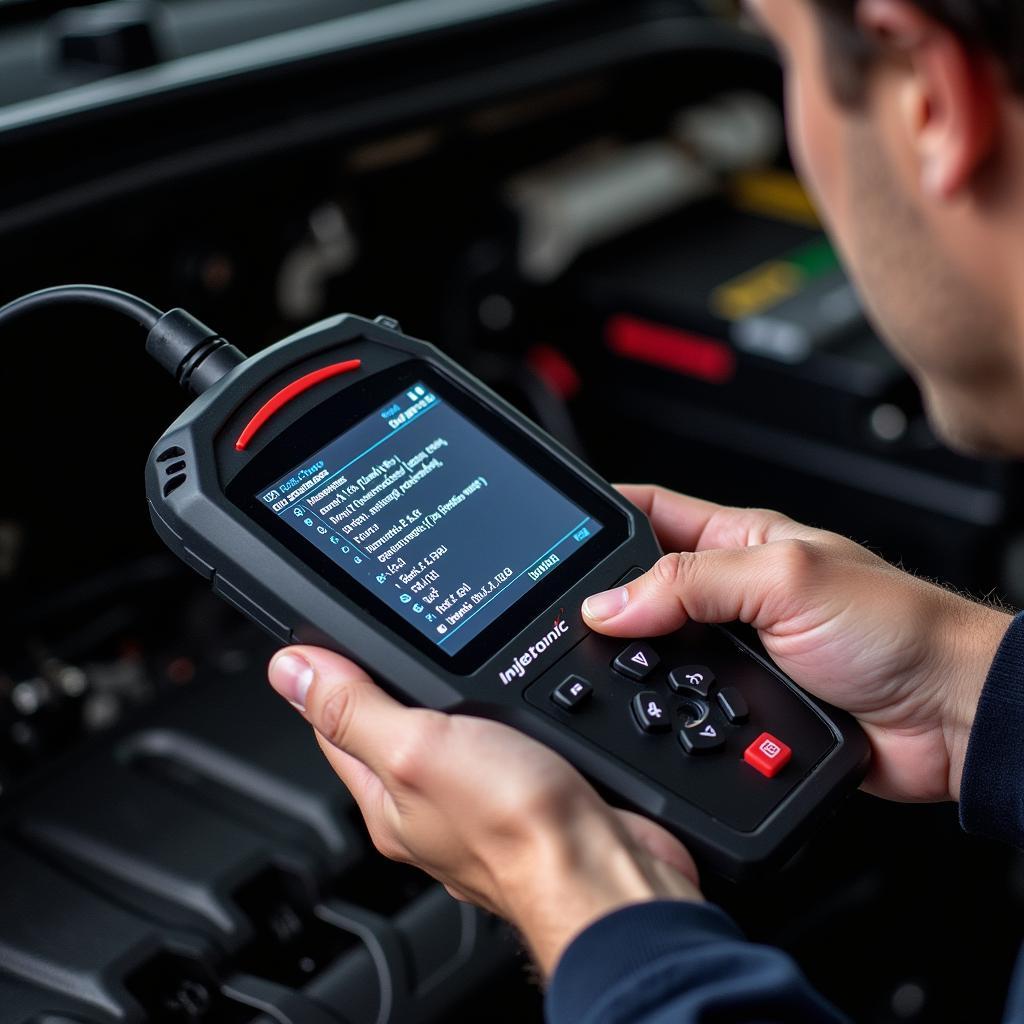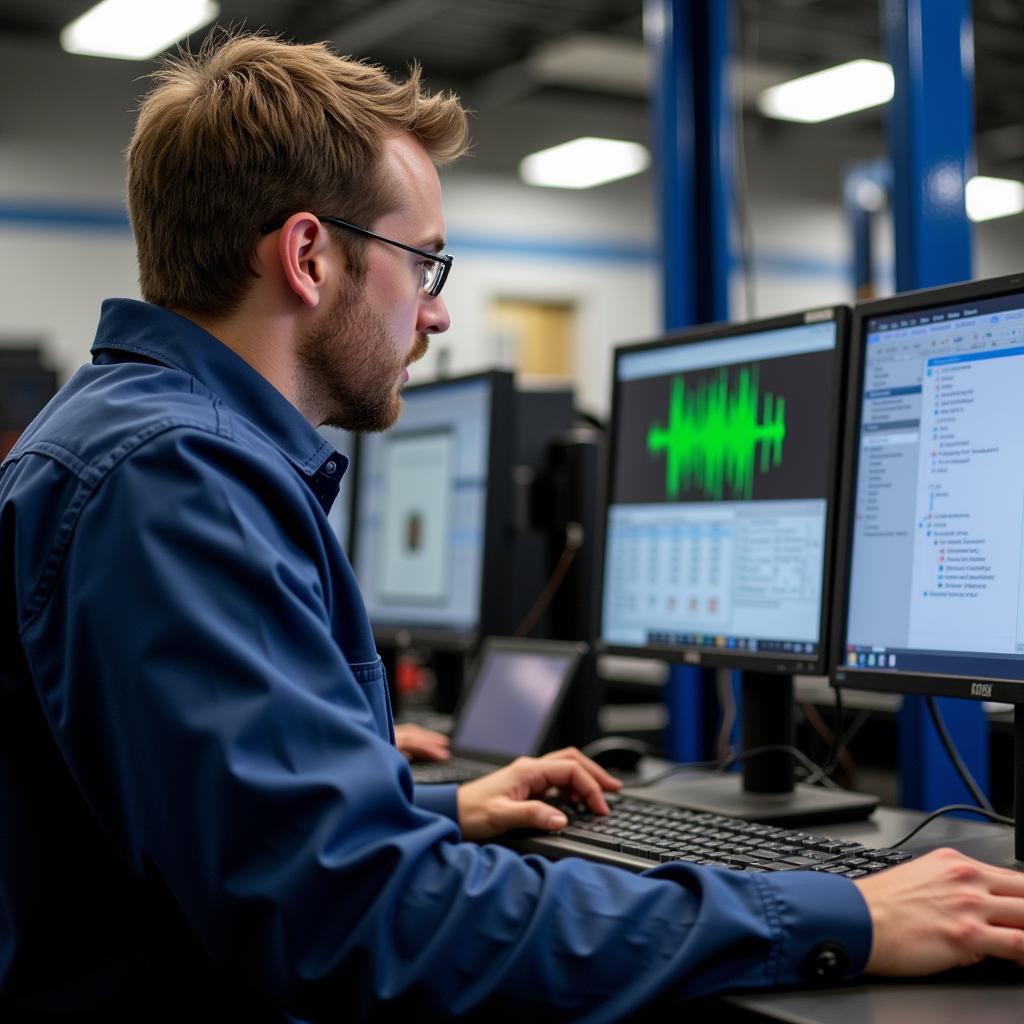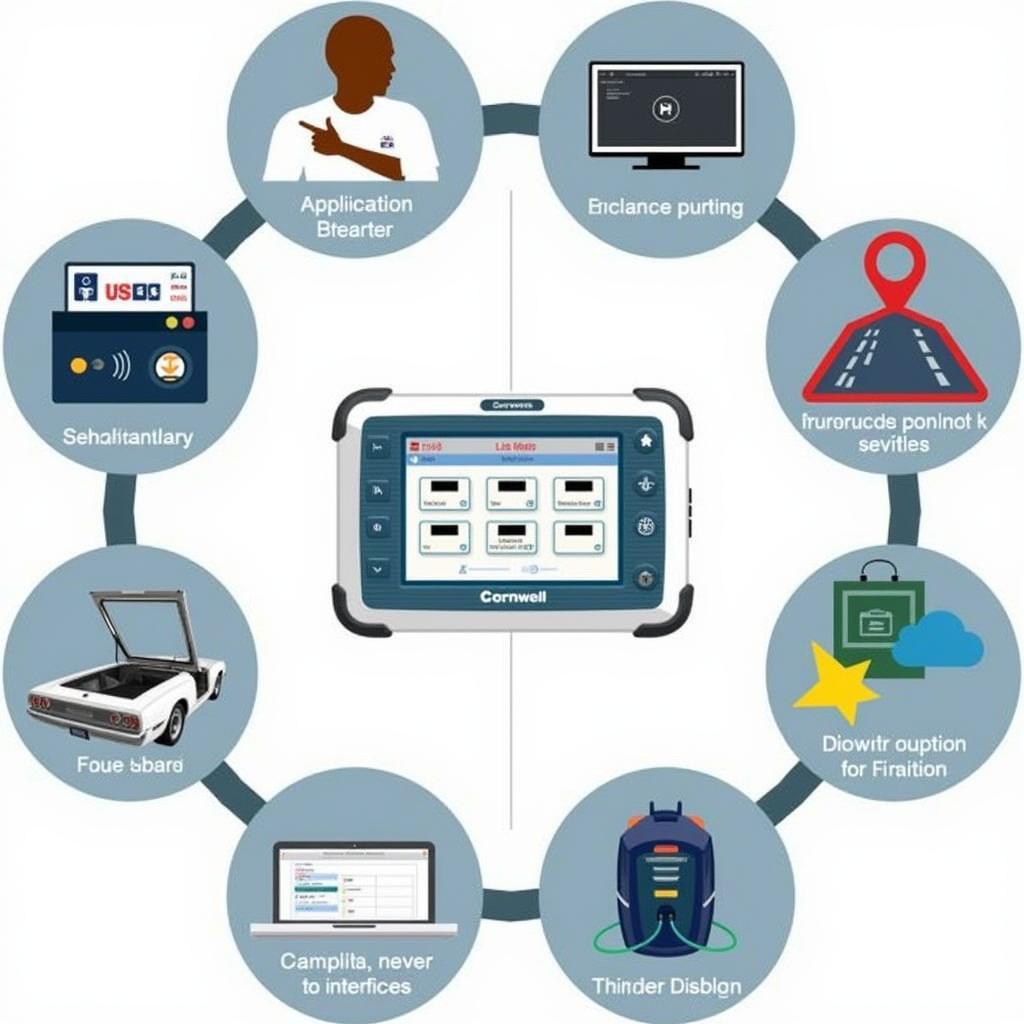Injectronic Scan Tools have become essential equipment for any automotive repair shop or technician dealing with today’s increasingly complex vehicles. These powerful diagnostic tools provide a window into the inner workings of a car’s electronic control units (ECUs), enabling accurate identification and resolution of issues that were once incredibly difficult to pinpoint.
Why are Injectronic Scan Tools Important?
Gone are the days of relying solely on mechanical expertise and intuition to diagnose car problems. Modern vehicles are driven by sophisticated computer systems that control everything from engine timing to airbag deployment. Injectronic scan tools act as the bridge between these complex systems and the technician, translating raw data from the vehicle’s ECUs into understandable information.
Key Features of Injectronic Scan Tools:
- Reading and Clearing Diagnostic Trouble Codes (DTCs): This is the most fundamental function of a scan tool. When the car’s onboard diagnostics detect a problem, a DTC is stored. Injectronic scan tools can retrieve and display these codes, giving technicians a starting point for diagnosis.
- Live Data Stream Monitoring: Beyond just reading codes, these tools allow mechanics to observe real-time data from various sensors and systems. This includes parameters like engine RPM, coolant temperature, oxygen sensor readings, and much more.
- Component Actuation: Injectronic scan tools offer the capability to activate specific components like fuel injectors, solenoids, and relays. This is crucial for testing the functionality of components and pinpointing the root cause of a problem.
- ECU Programming and Configuration: Advanced scan tools often include functionalities for programming and configuring ECUs. This is typically required when replacing faulty modules or updating software within the vehicle’s systems.
Benefits of Using Injectronic Scan Tools:
- Increased Accuracy: By providing direct access to the vehicle’s data, injectronic scan tools drastically reduce the guesswork involved in diagnosing problems.
- Enhanced Efficiency: Quickly identifying issues means less time spent troubleshooting, leading to faster repairs and happier customers.
- Cost Savings: Accurate diagnosis prevents unnecessary part replacements, saving both the shop and the customer money in the long run.
- Improved Safety: By ensuring that critical safety systems are functioning correctly, these tools play a crucial role in keeping vehicles safe on the road.
 Technician Using Injectronic Scan Tool
Technician Using Injectronic Scan Tool
Choosing the Right Injectronic Scan Tool:
The market offers a wide range of injectronic scan tools, each with varying capabilities and price points.
- Entry-level tools: Ideal for DIY enthusiasts and small workshops, these offer basic code reading and clearing functionalities.
- Mid-range tools: Suitable for most independent shops, these provide more advanced features like live data monitoring and component actuation.
- High-end tools: Designed for dealerships and large repair facilities, these offer the most comprehensive functionalities, including ECU programming and advanced diagnostics.
Factors to consider when choosing a tool include your budget, the makes and models of vehicles you service, and the level of diagnostic capability required.
Mastering Injectronic Scan Tools:
While these tools are incredibly powerful, their effectiveness ultimately depends on the knowledge and expertise of the technician using them. Proper training and understanding of automotive systems are essential to interpret the data provided by injectronic scan tools accurately.
- Invest in training: Numerous online and in-person training courses are available, covering everything from basic scan tool operation to advanced diagnostics.
- Consult service information: Always refer to the vehicle’s specific service information for guidance on diagnostic procedures and code interpretations.
- Stay updated: Automotive technology is constantly evolving. Invest in ongoing training and keep your scan tool’s software up-to-date to stay ahead of the curve.
 Mechanic Learning to Use Scan Tool
Mechanic Learning to Use Scan Tool
“Injectronic scan tools are only as good as the person using them,” says John Smith, a veteran automotive electrician with over 20 years of experience. “It’s not just about reading codes; it’s about understanding the story those codes tell and using that information to fix the problem effectively.”
The Future of Automotive Diagnostics:
As vehicles become even more electronically complex, the role of injectronic scan tools will only continue to grow. Advancements in wireless technology and cloud-based platforms are already shaping the future of automotive diagnostics, enabling even more sophisticated data analysis and remote diagnostics.
Conclusion:
Injectronic scan tools are indispensable assets in modern automotive repair, providing technicians with the tools they need to diagnose and repair complex electronic systems accurately. By understanding the capabilities of these tools and investing in proper training, automotive professionals can enhance their diagnostic skills, improve efficiency, and stay ahead in the ever-evolving world of automotive technology.
Need help selecting the right injectronic scan tool for your needs or want to learn more about how these tools can revolutionize your repair process? Contact ScanToolUS today at +1 (641) 206-8880 or visit our office at 1615 S Laramie Ave, Cicero, IL 60804, USA.
FAQs
-
What is the difference between an OBD-II scanner and an injectronic scan tool?
OBD-II scanners are basic devices primarily designed to read and clear engine-related fault codes. Injectronic scan tools offer a much wider range of functions, including live data monitoring, component actuation, and ECU programming. -
Can I use an injectronic scan tool on any vehicle?
Most modern vehicles (post-1996) are equipped with the OBD-II standard, which most injectronic scan tools are compatible with. However, some vehicles may require manufacturer-specific adapters or software. -
How often should I update my injectronic scan tool software?
It’s recommended to update your scan tool software regularly, ideally whenever new updates are released by the manufacturer. This ensures compatibility with the latest vehicle models and access to new features. -
Are injectronic scan tools difficult to use?
While basic functions like code reading are relatively straightforward, mastering the full potential of an injectronic scan tool requires technical knowledge and training. -
Can an injectronic scan tool fix my car problems automatically?
No, these tools are diagnostic aids. They help pinpoint issues but do not fix them automatically. Repairs still require the expertise of a qualified technician.


Pingback: Component Actuation with Scan Tool: A Comprehensive Guide - Car Scan Tool